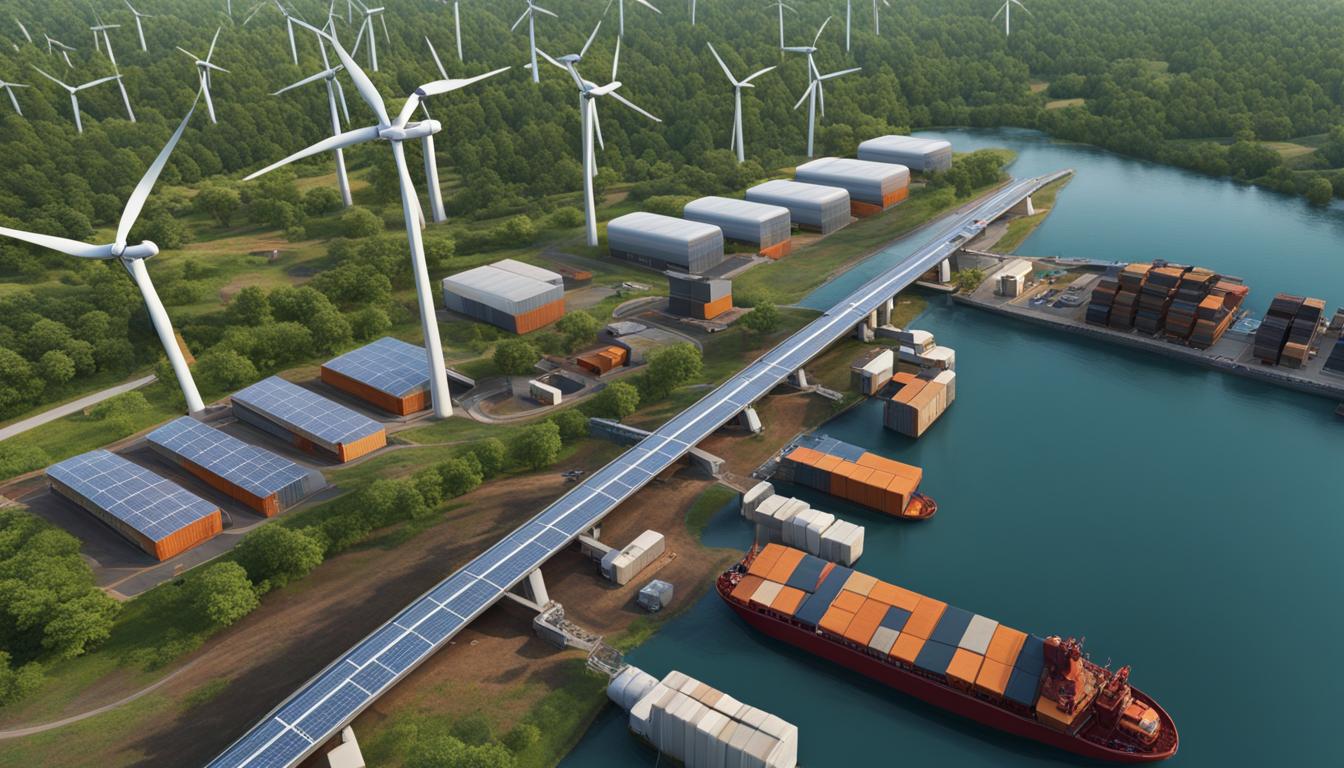Supply chain resilience is crucial for companies to withstand disruptions and ensure operational continuity. AI technologies play a significant role in promoting sustainability and security in supply chains. By leveraging AI, companies can enhance demand planning, supply management, and risk reduction. Additionally, AI applications enable companies to reduce emissions, improve safety, monitor supplier practices, and optimize transportation routes and cargo space.
Key Takeaways:
- AI technologies enhance supply chain resilience and sustainability.
- AI enables efficient demand planning, supply management, and risk reduction.
- AI applications help reduce emissions, improve safety, and monitor supplier practices.
- AI optimizes transportation routes and cargo space for eco-friendly operations.
- Implementing AI-powered solutions enhances organizational resilience and competitiveness.
The Importance of Supply Chain Sustainability
Supply chain sustainability has emerged as a critical aspect of business operations in today’s world. With increasing concerns about environmental impact and the rise of environmental, social, and governance (ESG) practices, companies are under pressure to adopt sustainable practices throughout their supply chains.
The environmental risks and costs associated with supply chains are significant. In fact, supply chain greenhouse gas emissions are often higher than operational emissions, making sustainability goals in supply chains imperative. By implementing sustainable practices, companies not only reduce their environmental impact but also enhance their overall resilience and well-being. This is crucial as stakeholders, including customers and investors, are increasingly demanding transparency and accountability in ESG practices.
Regulatory compliance and reporting requirements further underline the need for companies to track, measure, and address their impact on the environment and communities they operate in. By prioritizing supply chain sustainability, companies can demonstrate their commitment to ethical business practices, attract socially conscious customers, and mitigate potential risks associated with non-compliance.
Environmental Impact of Supply Chains
Supply chains have a significant environmental footprint, contributing to deforestation, pollution, and greenhouse gas emissions. By adopting sustainable practices throughout the supply chain, companies can minimize these negative impacts and contribute to the preservation of biodiversity and ecosystems.
“Sustainability is not just a moral imperative, but also a strategic advantage for businesses operating in today’s environmentally conscious world.”
| Environmental Impact | ESG Practices |
|---|---|
| Deforestation | Responsible sourcing and procurement |
| Pollution | Proper waste management and disposal |
| Greenhouse gas emissions | Reducing carbon footprint through energy-efficient transportation and renewable energy sources |
| Water consumption | Implementing water conservation measures |
By addressing these environmental challenges, companies can not only contribute positively to the planet but also enhance their brand reputation, attract environmentally conscious customers, and gain a competitive edge in the market.
AI Solutions for Supply Chain Sustainability
The integration of artificial intelligence (AI) technology in supply chain management has revolutionized the way companies approach sustainability. AI-enabled tools offer promising solutions for enhancing supply chain sustainability, reducing emissions, increasing safety, and mitigating supplier risks.
One key area where AI brings significant benefits is in reducing emissions. By providing real-time visibility and insights, AI solutions help companies optimize transportation routes and cargo space, leading to more efficient vehicle use and lower emissions. Additionally, AI algorithms can monitor warehouse and transit conditions, allowing for proactive adjustments that enhance safety and further contribute to overall sustainability.
AI-powered technologies also play a vital role in supplier risk reduction. Through AI-driven algorithms, companies can track supplier practices, vet prospective suppliers, and promote sustainable procurement practices. This ensures that suppliers align with sustainability goals, reducing the environmental impact of the supply chain and mitigating risks associated with non-compliant or unethical practices.
Benefits of AI Solutions in Supply Chain Sustainability:
- Reducing emissions through optimized transportation routes and efficient vehicle use
- Increasing safety by monitoring warehouse and transit conditions in real time
- Mitigating supplier risks by tracking supplier practices and promoting sustainable procurement
By leveraging AI solutions, companies can make significant progress in their sustainability efforts, improving environmental performance, enhancing operational efficiency, and meeting the growing demands of stakeholders and consumers for responsible and eco-friendly supply chains.

AI for Waste Management and Inventory Optimization
Inventory management and waste reduction are key challenges for companies operating in complex supply chains. AI-powered solutions offer innovative ways to address these issues and optimize operations. By leveraging advanced data analysis capabilities, AI helps businesses accurately predict demand, optimize stock levels, and track product movement effectively, reducing storage costs and minimizing waste. Additionally, AI-driven technologies enable dynamic pricing strategies, improving inventory turnover and decreasing holding expenses.
One of the main advantages of AI in waste management is its ability to accurately forecast demand. By analyzing historical data, market trends, and other relevant factors, AI algorithms can predict demand fluctuations with greater precision. This allows companies to adjust their inventory levels accordingly, minimizing stockouts and overstocking.
In addition to demand forecasting, AI plays a crucial role in optimizing warehouse operations. By analyzing real-time data from sensors and other sources, AI algorithms can identify areas for improvement in terms of layout, storage capacity, and workflow. This helps businesses maximize space utilization, reduce handling time, and enhance overall efficiency.
“AI-driven solutions help businesses optimize inventory levels, reduce storage costs, and minimize waste.”
Table: AI-Enabled Waste Management and Inventory Optimization
| Benefit | Description |
|---|---|
| Accurate demand forecasting | AI algorithms analyze historical data, market trends, and other factors to predict demand fluctuations, reducing stockouts and overstocking. |
| Optimized warehouse operations | AI analyzes real-time data to identify areas for improvement in layout, storage capacity, and workflow, maximizing space utilization and reducing handling time. |
| Dynamic pricing strategies | AI-driven pricing algorithms adjust prices based on factors such as demand, competition, and inventory levels, optimizing inventory turnover and reducing holding expenses. |
By adopting AI-powered solutions for waste management and inventory optimization, businesses can achieve significant cost savings, improve operational efficiency, and minimize their environmental footprint. The ability to accurately forecast demand, optimize warehouse operations, and implement dynamic pricing strategies gives organizations a competitive edge in today’s fast-paced and volatile market.
Advantages of AI in Delivery Operations
AI-powered solutions offer numerous advantages in delivery operations, optimizing efficiency, preventing fraud, and reducing costs. Through real-time insights and advanced algorithms, AI enhances the entire delivery process, from route planning to package tracking.
Delivery Efficiency
AI algorithms optimize delivery routes by considering factors such as traffic patterns, weather conditions, and customer preferences. By analyzing historical data and making predictions, AI can suggest the most efficient routes, reducing delivery time and improving customer satisfaction. Additionally, AI-powered systems can monitor and adjust delivery schedules in real-time, ensuring timely and accurate deliveries.
Fraud Prevention
The integration of AI in delivery operations enables effective detection and prevention of fraudulent activities. AI algorithms analyze patterns and anomalies in delivery data to identify potential fraud risks, such as unauthorized package diversions or suspicious delivery attempts. By flagging such anomalies, AI-powered systems can help companies mitigate fraud risks and maintain the integrity of their delivery processes.
Cost Reduction
AI-driven delivery operations can significantly reduce costs for companies. By optimizing delivery routes and minimizing fuel consumption, AI helps decrease transportation expenses. Additionally, AI algorithms enable efficient resource allocation, ensuring optimal utilization of delivery vehicles and personnel. This streamlined resource management results in cost savings and improved operational efficiency.

In conclusion, the integration of AI in delivery operations brings numerous benefits to companies. From optimizing delivery routes to preventing fraud and reducing costs, AI-powered systems enhance the overall efficiency of the delivery process. As AI technologies continue to evolve, we can expect further advancements in delivery operations, leading to even greater efficiency, security, and cost-effectiveness.
Conclusion
In conclusion, the integration of generative AI in supply chain management is essential for building adaptive and resilient supply ecosystems. By leveraging the power of generative AI, companies can effectively stratify risks, analyze ecosystem diversity, and plan for business resiliency. The application of generative AI enables least-cost routing, disruption prevention, and comprehensive scenario planning, ensuring operational continuity even in uncertain times.
Implementing AI-driven supply chains brings numerous benefits. Improved visibility allows companies to have real-time insights into their supply chain processes, resulting in increased efficiency and reduced costs. Furthermore, generative AI enhances customer satisfaction by optimizing delivery routes and minimizing delivery time. By embracing generative AI, companies can create agile and responsive supply ecosystems that can adapt to dynamic market conditions.
The future of supply chain management lies in the continuous evolution of generative AI. As AI algorithms become more sophisticated, they will shape the way companies thrive, innovate, and navigate uncertainties in the supply chain. With generative AI, businesses can proactively identify and address potential disruptions, ensuring smoother operations and a competitive edge in the market.
FAQ
What is the role of AI in supply chain sustainability?
AI technologies enable companies to enhance demand planning, supply management, and risk reduction, leading to improved sustainability and security in supply chains.
Why is supply chain sustainability important?
Supply chains are vulnerable to environmental, social, and governance (ESG) transgressions. Implementing sustainable practices reduces environmental impact, enhances resilience, and meets regulatory and stakeholder demands.
How can AI solutions help reduce emissions in supply chains?
AI provides real-time visibility and insights to optimize shipping routes and vehicle use, resulting in reduced emissions. AI algorithms can monitor warehouse and transit conditions, ensuring safety and making critical adjustments in real time.
What role does AI play in waste management and inventory optimization?
AI accurately predicts demand, optimizing stock levels, reducing storage costs, and improving inventory turnover through dynamic pricing strategies. It also streamlines supply chain management processes by assessing and monitoring supplier sustainability practices and certifications.
How does AI enhance delivery operations?
AI provides real-time insights to optimize delivery routes, minimize fuel consumption and emissions, and prevent theft and fraud by detecting anomalies and integrating security measures. Robotics and autonomous vehicles driven by AI revolutionize warehouse operations and transportation.
How does generative AI contribute to supply chain resilience?
Generative AI aids in risk stratification, ecosystem diversity analysis, business resiliency planning, and comprehensive scenario planning. It improves visibility, efficiency, cost reduction, and customer satisfaction, shaping the future of supply chain management.
- Regulatory and Compliance: Pioneering the Future of Saudi Arabia’s Dedicated Cargo Airline - December 21, 2024
- Financial Strategies: Fueling the Growth of Saudi Arabia’s Dedicated Cargo Airline - December 20, 2024
- Operational Excellence: Ensuring Competitive Edge for Saudi Arabia’s Dedicated Cargo Airline - December 19, 2024






